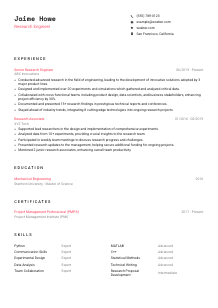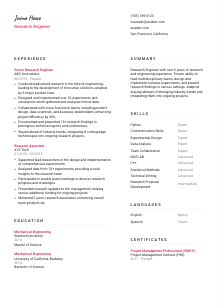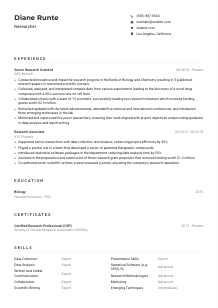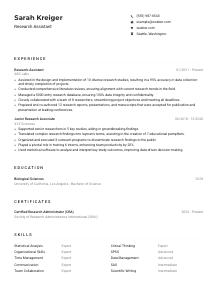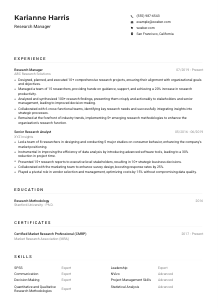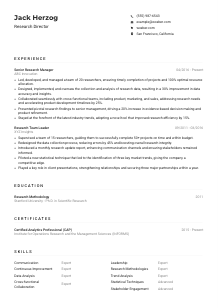Research Engineer Resume Example
Delving into discoveries, but your resume is yet to innovate? Uncover this Research Engineer resume example, engineered with Wozber free resume builder. Discover how to present your scientific strides to sync with job objectives, leading your career to groundbreaking breakthroughs!
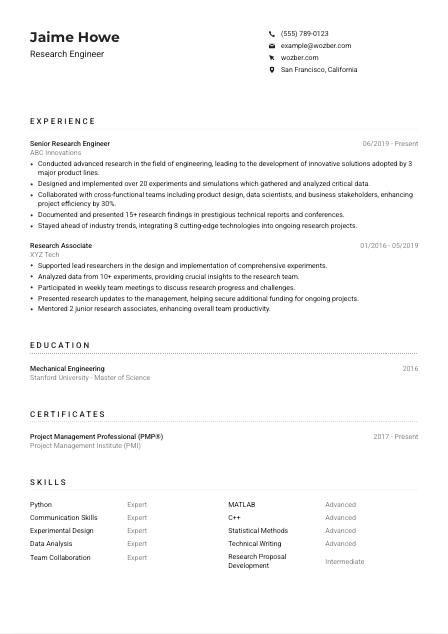
How to write a Research Engineer Resume?
Greetings, aspiring Research Engineer! In today's cutthroat job market, your resume is not just a document but a ticket to your dream job. Tailoring your resume to the Research Engineer role using a free resume builder like Wozber, with its ATS-friendly resume template and ATS resume scanner, is paramount.
Ready to craft a resume that not only meets the job description but also showcases your unique brilliance? Let's dive in and turn your credentials into a compelling narrative that lands you the Research Engineer position.
Personal Details
The Personal Details section is your chance to make an indelible first impression. It's where you lay the groundwork for your candidacy. For a Research Engineer position, it's crucial to present this information in a way that resonates with the technical and professional essence of the role.
1. Name as Your Brand
Think of your name as the logo of your professional brand. Use a clear, easy-to-read font, possibly a notch bigger than the rest of the text for visibility. This ensures your name sticks in the hiring manager's memory.
2. Job Title Precision
Positioning the job title 'Research Engineer' directly beneath your name aligns your application with the role at a glance. It instantly informs the recruiter of the position you're after, acting like a targeted headline that sets the tone.
3. Essential Contact Info
Ensure your contact details are correct and professional, especially your email, which should follow the firstname.lastname@email.com format. A typo here could mean a missed opportunity.
4. Geo-Tagging
Mention 'San Francisco, California' explicitly if you're local, as this matches one of the job's logistics requirements straight away, signaling to the employer that you're ready to hit the ground running without the delays of relocation.
5. Digital Footprint
In today's digital age, including a link to a professionally curated LinkedIn profile or a personal website showcasing your portfolio can be a powerful testament to your dedication and expertise. Make sure it's clean, updated, and mirrors the prowess stated in your resume.
Takeaway
Crafting the Personal Details section with care and precision sets a strong professional tone for your resume. It's more than just contact information; it's an opportunity to present yourself as the well-organized, readily available, and detail-oriented candidate the hiring manager needs.





Experience
The Experience section is where you shine a spotlight on your achievements and how they align with the role's requirements. Threading your professional journey with the Research Engineer role's specifics is key to making a strong impact.
- Conducted advanced research in the field of engineering, leading to the development of innovative solutions adopted by 3 major product lines.
- Designed and implemented over 20 experiments and simulations which gathered and analyzed critical data.
- Collaborated with cross‑functional teams including product design, data scientists, and business stakeholders, enhancing project efficiency by 30%.
- Documented and presented 15+ research findings in prestigious technical reports and conferences.
- Stayed ahead of industry trends, integrating 8 cutting‑edge technologies into ongoing research projects.
- Supported lead researchers in the design and implementation of comprehensive experiments.
- Analyzed data from 10+ experiments, providing crucial insights to the research team.
- Participated in weekly team meetings to discuss research progress and challenges.
- Presented research updates to the management, helping secure additional funding for ongoing projects.
- Mentored 2 junior research associates, enhancing overall team productivity.
1. Dissect Job Requirements
Start by dissecting the job description, especially looking for overlap with your past roles. Highlight skills and experiences that directly relate to 'conducting advanced research', 'designing experiments', and 'collaborating with cross-functional teams'.
2. Present Role-Company-Duration
Organize your experience in a reverse-chronological order, leading with your most recent role. Clearly delineate your job title, the company's name, and your tenure to provide a quick, clear timeline of your career progression.
3. Craft Accomplishment Statements
Develop accomplishment statements that reflect the key responsibilities in the job description. For instance, 'Conducted advanced research leading to innovative solutions...' directly corresponds with the role's call for research and development expertise.
4. Quantification
Numbers speak louder than words. Quantifying your achievements, such as 'enhanced project efficiency by 30%' or 'integrated 8 cutting-edge technologies', provides tangible evidence of your impact and technical proficiency.
5. Relevance Is Key
Filter your experiences through the lens of the Research Engineer role. Each bullet point should build the case for why you're the ideal candidate. Non-relevant accolades, no matter how impressive, can distract from your tailored message.
Takeaway
Your Experience section is the cornerstone of your resume, where your professional journey is mapped out in alignment with the expectations for a Research Engineer. It's your chance to prove your capability and readiness for the challenges of the role. Highlight, quantify, and stay relevant.
Education
In the Research Engineer role, your educational background is more than a formality—it's the foundation of your expertise. Let's sculpt the Education section to reflect your qualifications and resonate with the recruiter's expectations.
1. Education Requirements
For a Research Engineer, a 'Bachelor's degree in Engineering, Computer Science, or related field' is a must. If you have a 'Master's degree', as preferred in the job description, make sure it's prominently featured.
2. Clear Structure
Maintain clarity and brevity in your Education section. List your degree, followed by your field of study, the institution's name, and then your graduation year. This straightforward format ensures easy readability and comprehension.
3. Degree Specifics
If your degree directly aligns with the job description (like a 'Master of Science in Mechanical Engineering' for a Research Engineer), highlight it. It instantly affirms your academic alignment with the job's requirements.
4. Relevant Courses and Projects
Including relevant coursework or projects is particularly beneficial if they underline your expertise and dedication to the Research Engineering field. This can be especially compelling for recently graduated candidates or those transitioning from a different discipline.
5. Additional Academic Achievements
If you've received any honors, participated in pertinent extracurricular activities, or completed significant projects or thesis work that underscores your suitability for the role, include these details. They add depth to your educational narrative.
Takeaway
Your education is a testament to your theoretical knowledge and commitment to your field. Tailor this section to highlight your alignment with the Research Engineer role, underscoring your qualifications with clarity and succinctness.
Certificates
While the job description for a Research Engineer might not specify required certifications, strategically selected and presented certificates can significantly bolster your candidacy by demonstrating ongoing learning and specialized skills.
1. Extract Job Essentials
Review the job posting carefully, noting keywords and any implied certificate preferences. Even if certifications aren't explicitly required, aligning with industry standards and technical proficiencies can give you an edge.
2. Targeted Certificates
Choose to list certificates that closely relate to the technical and experimental skills expected of a Research Engineer, such as 'Project Management Professional (PMP®)' to highlight your project management acumen.
3. Date Relevance
For each certificate, include the date of acquisition, especially for recent achievements. This showcases your commitment to continuous learning and staying abreast of current methodologies and technologies.
4. Continuous Learning
The field of research and development is ever-evolving. Demonstrate your dedication to growth by periodically updating your certifications and pursuing new learning opportunities relevant to your career aspirations as a Research Engineer.
Takeaway
Your certifications are a powerful testament to your expertise and dedication to professional development. Select and present them in a way that directly aligns with the demands of a Research Engineer, showcasing your continuous journey of learning and growth.
Skills
In this highly technical role, your skills section is your professional toolkit on display. Let's align it precisely with the job requirements, spotlighting your hard and soft skills that directly relate to being a successful Research Engineer.
1. Job Requirement Translation
Begin by breaking down the job description. Identify both the stated and implied skills, such as 'strong proficiency in programming languages' and 'expertise in experimental design', which are crucial for a Research Engineer.
2. Direct Skill Alignment
Match your skill set with the job description, emphasizing your expertise in 'Python', 'MATLAB', and 'C++', along with soft skills like 'excellent communication skills' and 'ability to collaborate with multidisciplinary teams'.
3. Organization and Precision
Categorize your skills in a manner that is easy to read and ensures the most critical skills for the position stand out. Keep the list concise, focusing on the skills that best demonstrate your fit for the Research Engineer role.
Takeaway
The Skills section is your opportunity to spotlight the technical and interpersonal tools you bring to the Research Engineer position. Carefully selected and organized, these skills make a compelling case for your candidacy.
Languages
The ability to communicate in multiple languages is a standout skill, especially in research environments that are increasingly global. Here's how to effectively leverage your multilingual prowess for the Research Engineer position.
1. Job Language Needs
Review the job description to identify explicit language requirements. 'Proficient English language use' was stated, so this should be your primary focus, ensuring you meet the baseline expectation.
2. Highlighting Essential Languages
List English first, indicating your proficiency level as 'Native' or 'Fluent', to directly address the job's linguistic requirement. This is fundamental for roles expecting you to communicate findings or collaborate internationally.
3. Adding Additional Languages
Beyond the necessary language(s), list others you're proficient in. This can be particularly advantageous in a role that has global implications or collaborations, showcasing your ability to communicate across cultures.
4. Honest Proficiency Levels
Be transparent about your proficiency levels. Using terms like ‘Native', ‘Fluent', ‘Intermediate', and ‘Basic' provides a clear understanding of your linguistic capabilities, setting the right expectations.
5. Understanding Role Context
Consider how your language skills can be an asset in the specific context of a Research Engineer role. In environments where collaboration with international teams is common, showcasing linguistic diversity can be a strong advantage.
Takeaway
Your language skills are not just a measure of communication but a mark of your ability to participate and lead in a global research environment. Highlight your linguistic abilities precisely, showcasing how they can add value to the Research Engineer role.
Summary
A compelling Summary is the finishing touch on your resume, encapsulating your professional essence. Let's tailor a Summary that sings your praises and solidifies your suitability for the Research Engineer position.
1. Job Essence Understanding
Begin with a deep dive into the essence of the Research Engineer role. Reflect on how your unique blend of skills, experience, and education equips you to excel in this role.
2. Introducing Yourself
Open with a strong statement that captures your professional identity and career trajectory. This sets the stage, portraying you as a confident candidate for the Research Engineer role.
3. Addressing Key Requirements
In a few concise lines, connect your top achievements and skills to the job's requirements. Mention 'over 6 years of research and engineering experience' and 'proven ability to lead multidisciplinary teams' to address directly the role's expectations.
4. Keeping It Concise
While it's tempting to include every achievement and skill, remember, the Summary is just that—a summary. It should tease what's to come in your resume, intriguing the hiring manager to read further.
Takeaway
Your Summary is the hook that catches the attention of hiring managers. Tailored to the Research Engineer position, it presents a snapshot of your career and the unique value you bring to the role. Let it resonate with confidence and clarity, setting the stage for your detailed resume.
Embarking on Your Research Engineer Journey
Congratulations on completing the step-by-step guide to crafting a standout resume for a Research Engineer role! Armed with these insights, you're now equipped to create a resume using Wozber's free resume builder that doesn't just fulfill the job requirements but showcases your unique professional value. Remember, your resume is the bridge to your next great opportunity.
Fine-tune it with care, infuse it with your unique achievements, and leverage Wozber's ATS-friendly resume template and ATS resume scanner for optimization. The path to your Research Engineer role is clear—go forth and conquer!

- Bachelor's degree in Engineering, Computer Science, or related field;
- Master's degree preferred.
- Minimum of 3 years of experience in research and development or related fields.
- Strong proficiency in programming languages such as Python, MATLAB, or C++.
- Expertise in experimental design, data analysis, and statistical methods.
- Excellent communication skills to collaborate with multidisciplinary teams and present research findings.
- Proficient English language use is a job necessity.
- Must be located in or willing to relocate to San Francisco, California.
- Conduct advanced research in assigned field and develop innovative solutions.
- Design and implement experiments and simulations to gather data and validate hypotheses.
- Collaborate with cross-functional teams including product design and development, data scientists, and business stakeholders.
- Document and present research findings in technical reports, papers, and conferences.
- Stay up to date with the latest industry trends and technologies to ensure research remains relevant and cutting-edge.





